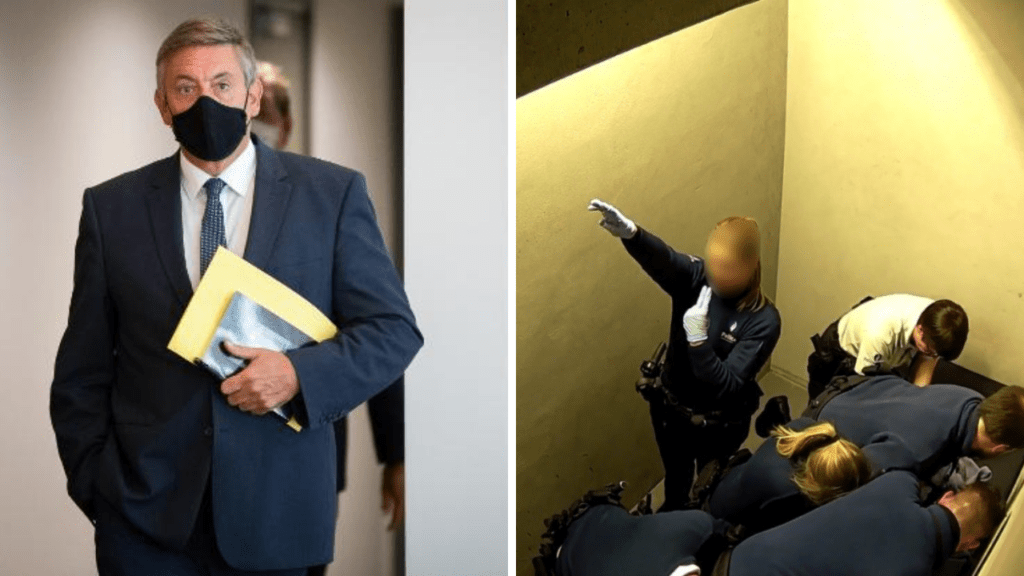Former Belgian Interior Minister Jan Jambon has defended his previous actions in the face of mounting pressure over the improper handling of the death of a Slovak man following an arrest at Charleroi Airport in 2018.
"I would like to reiterate clearly that the footage that showed up in the press was completely new to me. It was not familiar to me or my cabinet," said Jambon in the Parliamentary Committee on Justice and Home Affairs on Tuesday.
The footage he refers to emerged two weeks ago, and shows several police officers inside the cell holding 38-year-old Slovak national Jozef Chovanec, who was tied-up at his hands and feet, as one officer climbs on top of him and kneels on his back for several minutes.
A female police officer can be seen doing a Nazi salute with one hand while mimicking Hitler’s signature moustache with the other.
"I was shocked, like everyone else, when I first saw [the footage]. I always mean well with the police and will defend their job with passion, but what I see in those images is inadmissible, inexplicable and terrible, for their colleagues and for society as a whole," Jambon said.
Since the cell footage emerged, many questions about the incident and subsequent events have arisen, including how it is possible that neither Jambon nor police officials were informed, and why they never pressed the issue.
The case file as it is now presented in the press is very different from the one presented to Jambon in February 2018, he said. In a "neutral and concise" police report, the incident was presented as a forceful police intervention, followed by a death in hospital a few days later.
Related News
- Fatal arrest at Charleroi Airport: minister to tell his side of the story
- De Crem: Jambon knew about Charleroi Airport death in 2018
- Fatal Charleroi arrest: 'fascists have no place' in police, airport minister says
Apart from that, Jambon had no other information, he stated, adding that "the information that appeared in the press at the time did not raise any questions for anyone."
At the end of February 2018, the Charleroi public prosecutor's office informed the press of the opening of an investigation, in particular, to ensure that the procedure had been respected. The Slovak ambassador was received twice at Jambon's office - once by the minister himself - and he had a meeting in July with a director of Foreign Affairs, of which the Interior Ministry was informed.
Jambon insisted that his cabinet acted proactively, saying that they were the ones to request the report on 26 February, following the request of the Slovak ambassador, stressing that he would not even have seen the report otherwise.
"That report does not indicate that there was anything more going on," he said, adding that it describes a difficult arrest, but that "at no time" it mentions the "terrible acts" seen in the video footage.
"I have no built-in distrust of the police. Imagine if we lived in a society like that," Jambon added.
In the absence of information regarding criminal offences, the law does not allow the Minister of the Interior to open disciplinary proceedings, Jambon explained. "I did not have this information at the time, and I had no reason to believe that it existed," he said.
Catherine De Bolle, who led the federal police at the time and is currently the director of Interpol, was also present in the committee. "I can honestly say that I was not informed [of all the facts] and that they should have been brought to my attention. Had that been the case, I would have taken action," she said.
"I can only conclude that the information had not reached me. I am therefore counting on the internal procedure to find out why the existing procedure did not work and, above all, why no one reported the events to me," she added.
De Bolle's successor, Marc De Mesmaeker, was at the time head of the Administrative and Technical Secretariat (SAT), which liaised between the Interior Ministry and the police.
"I think I did my job, and more than that," he told the Parliament. "I acted correctly, transparently and accurately. So I can say in good faith that we have dealt with this dossier according to all the procedures," he said, adding that, as Commissioner-General, he could assume that everyone had done their job.
As far as the internal investigation that has been opened following the emergence of the footage is concerned, De Mesmaeker emphasised that there are two parts.
"I understand society's indignation, the call for swift punishment is resounding. But conducting an internal investigation professionally means respecting the rights of the defence. We will take responsibility, but according to the rules and the law," De Mesmaeker said.
The behaviour of police officers is another matter, according to De Mesmaeker. "All those responsible play an important role in this. Inappropriate behaviour must be followed up on, at all times and everywhere."
Maïthé Chini
The Brussels Times

